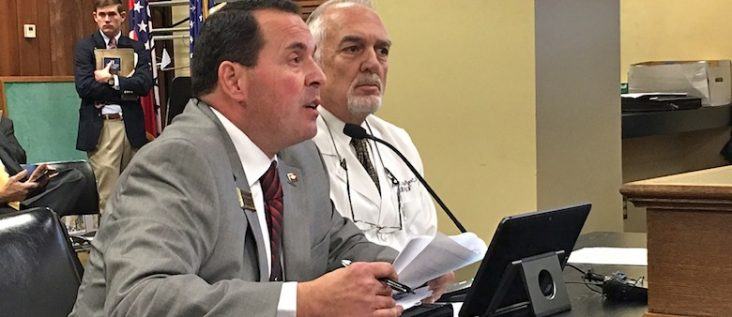Ban on abortion procedure passes Arkansas House panel
by January 19, 2017 2:32 pm 698 views

Rep. Andy Mayberry, R-Hensley, and Dr. Richard Wyatt, a Little Rock-based obstetrician-gynecologist
A bill outlawing the most common second trimester abortion procedure passed the Arkansas House Public Health, Welfare and Labor Committee Thursday (Jan. 19). A representative of the state chapter of the American Civil Liberties Union promised a lawsuit.
House Bill 1032, the Arkansas Unborn Child Protection from Dismemberment Abortion Act, would outlaw abortions where the unborn child is dismembered and extracted from the uterus one piece at a time. The medical term is dilation and evacuation.
The bill, filed by Rep. Andy Mayberry, R-Hensley, applies only to physicians, and violations would be a Class D felony. It would allow dismemberment abortions when the mother faces a “serious health risk” – death or “the serious risk of substantial and irreversible physical impairment of a major bodily function of the pregnant woman.”
The bill passed on a voice vote, with Rep. Fred Love, D-Little Rock, and Rep. Ferguson, D-West Memphis, voting no.
According to Mayberry, the bill is based on model legislation by National Right to Life and has been passed in six states. In four of them, Alabama, Kansas, Louisiana and Oklahoma, the law has been challenged and enforcement enjoined or delayed. It has become effective in Mississippi and West Virginia.
Testifying before legislators, Mayberry said the bill would prohibit a procedure used in 96% of all second trimester abortions. He called this procedure “particularly barbaric and cruel and savage.” He called himself “unabashedly pro-life, and I would love to be able to come to you someday and be able to say that we have a bill that would just end abortion.”
Victoria Leigh, a private practice attorney representing the state’s ACLU affiliate, told legislators the bill would outlaw the most common and safest procedure for second trimester abortions. She said the bill is “blatantly, facially unconstitutional” and that the ACLU and perhaps other organizations would sue, causing the state to pay legal expenses for a case it would not win. She later told reporters it would create a burden for women to access abortions, forcing them to undergo more invasive and expensive procedures.
“This bill affects the ability of a woman to choose the best medical treatment with the input from her medical doctor, and it substitutes the judgment of this assembly in place of a medical professional,” she told legislators.
Dr. Richard Wyatt, a Little Rock-based obstetrician-gynecologist who said he has “delivered babies for over 30 years,” testified alongside Mayberry and described the last time he participated in the procedure as a UAMS resident. The doctor pulls pieces of the fetus bit by bit from the womb, placing them behind him to eventually reassemble the “baby back together like a puzzle” to ensure nothing is left inside. The last step is to crush the fetus’s head and then extract it. When the doctor did that, he noticed a piece of stool, which must have come from the mother. He had perforated her uterus and colon, requiring her to have major surgery and a temporary colostomy.
Leigh told legislators that mothers would have only one other choice, an invasive procedure that requires hospitalization. Wyatt said he administers medicine to mothers when the fetus dies in the womb in the second semester, inducing labor, and the same could be done in abortions.
“I think this is a total unnecessary procedure,” he said.
In 2013, Mayberry sponsored Act 701, which bans most abortions in Arkansas after 20 weeks. He said in an interview that while his bill wouldn’t prohibit any abortions, he hopes it results in fewer of them as people become more educated about alternatives. He said he has no plans to introduce any other abortion bills this session, though other legislators could file bills.
He is the state president of Arkansas Right to Life, which will host its annual March for Life Sunday in Little Rock. A Women’s March for Arkansas is planned for Friday, and a Rally for Reproductive Justice is planned for Jan. 28.
